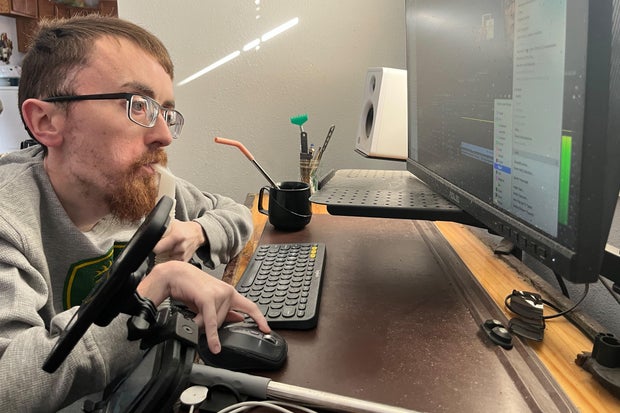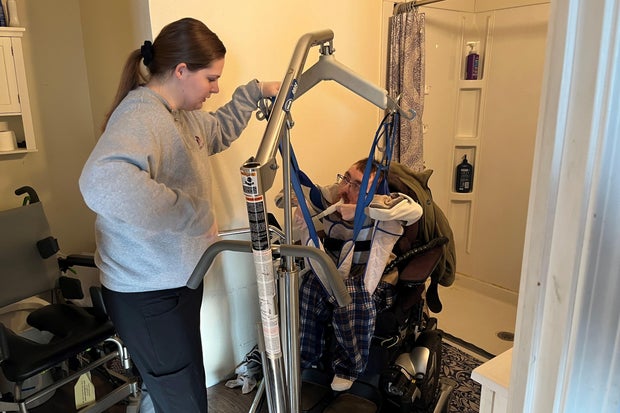Pleasantville, Iowa – Zach Mecham has heard that politicians are asking Medicaid recipients to work or lose benefits. He also encountered a series of Medicaid rules that effectively prevented many people with disabilities from working full-time.
“Who is it? Do you want us to work?” he said.
Mecham, 31, relies on public insurance plans to pay for services that help him live alone, despite disability caused by muscle dysnutrition. He walked around in his wheelchair and then breathed on a portable ventilator.
A paid assistant keeps in touch with Mecham at night. Then a home health assistant comes in the morning to help him get up, go to the bathroom, take a shower, and put on clothes on his online marketing business. He said without help, he would have to close the company and move into a nursing home.
Private health insurance plans generally do not cover such support services, so he relies on Medicaid, which is jointly funded by federal and state governments and covers millions of Americans with income or disabilities.
(Tony Leys/KFF Health News)
Like most other states, Iowa also has a Medicaid “buy program” that can be added to Medicaid even if it earns a little higher than what is usually allowed. About two-thirds of these plans charge premiums, and most people are in how much money participants can make and save.
Some states have proposed or eliminated such financial caps for people with disabilities. Mecham has travelled to the Iowa Capitol several times, lobbying lawmakers to follow the leaders of these states. The “No Worry Job” bill would remove income and asset caps, requiring people with disabilities in Iowa to pay 6% of their income as premiums to retain Medicaid. If participants pay premiums for employer-based health insurance, this will help cover standard health services, these fees will be exempted.
Disability rights advocates say the Medicaid buying program's income and asset caps can prevent participants from working full-time or accepting promotions. “It's a trap – a trap of poverty,” said Stephen Lieberman, policy director for the United Spine Association.
According to the national legislature, lawmakers in Florida, Hawaii, Indiana, Iowa, Maine, Mississippi and New Jersey have introduced bills to address this year's problems.
Several other states have raised or removed the planned revenue and asset cap. Josh Turek, the council's bluffing representative for democracy, said Iowa's proposal was imitated under Tennessee law passed last year. Turek, of Bill, Iowa, used a wheelchair and won two gold medals as a member of the American Paralympic basketball team.
Proponents say allowing people with disabilities to make more money and who are still eligible for Medicaid will help alleviate ongoing worker shortages, including in rural areas where the working-age population is shrinking.
Turek believes that now is a good time to seek expanded employment rights for people with disabilities, as Republicans who control state and federal governments have been touting the value of that job. He smiled and said, “That's what I've been playing the trumpet.”
The Iowa Legislature has been asking many indivisible Medicaid recipients to work or record why they can’t work. Opponents say most Medicaid recipients who can work have done so, critics say job requirements add to the management of the Traditional Chinese Tape Festival and can cause Medicaid recipients to lose coverage on paperwork issues.
Iowa Gov. Kim Reynolds has made Medicaid job requirements a priority this year. “If you can, it should. It's common sense and good policy,” the Republican governor told lawmakers in January. “Returning to work can be a lifeline for stability and self-sufficiency.”
Her office did not answer questions about whether Reynolds supports eliminating income and asset limits for Iowa Buy Program, which is known as Medicaid for people with disabilities.
Spouse's income is capped
National Disability Rights Activists say income and asset limits on Medicaid discourage couples from getting married and even forces them to break up if one or two partners have disabilities. This is because in many states, spouse’s income and assets are counted when determining eligibility.
In Iowa, for example, a person’s monthly income cap is $3,138 and a couple is $4,259.
In Medicaid, Iowa currently has a single-person asset cap of $12,000. For a couple, the cap rose to just $13,000. Countable assets include investments, bank accounts, and other things that can be easily converted into cash, but not into main homes, vehicles, or furniture.
“You have couples who have been married for decades and they have to go through what we call a ‘Medicaid Divorce’ just to get these support and services that cannot be covered in any other way,” said Maria Town, president of the Americans with Disabilities.
The town said some states, including Massachusetts, have removed income caps for disabled people who want to join Medicaid. She said the cost of adding these people to the plan was at least offset by the premiums they paid and the premiums they paid for the increased taxes because they could work more time. “I don’t think it must be expensive for the state and the federal government,” she said.
Congress has considered a similar recommendation that allows people with disabilities to work more time without losing Social Security disability benefits, but the bill has not yet proposed progress.
Although most states have Medicaid income programs, enrollment is relatively low, said Alice Burns, Medicaid analyst at KFF.
Burns said the options cover less than 200,000 people nationwide. “There is indeed limited awareness of these plans,” she said.
According to a KFF analysis of 2022 data, in states with premiums for Medicaid buying programs, monthly expenses range from 10% to 10% of a person’s income.
Iowa bill removal hat
Iowa's proposal to lift revenue and asset caps has received bipartisan support from lawmakers, including 20-0 approval from the House Health and Public Services Committee. “This is consistent with the goals of both sides,” said Rep. Carter Nordman, a Republican, who chaired the bill's subcommittee. Nordman said he supports the idea but would like to see a formal estimate of how much it will cost to get more and more people with disabilities to participate in the Medicaid buying program.
Mecham lobbied the Iowa bill and said he hopes he can expand his online marketing and graphic design business “Zach of all industries.”
On a recent morning, sanitation assistant Courtnie Imler visited Mecham's modest house in Pleasantville, a small town of about 1,700 people in central Iowa's agricultural area. Imler chatted while carrying him from his wheelchair to the toilet with a gourd. She then cleaned him up, brushed her hair, and helped him put on his jeans and John Deere T-shirt. She poured a cup of coffee and put a straw in it so he could drink it himself, sweep the kitchen floor and wipe the counter. About an hour later, she said goodbye.
(Tony Leys/KFF Health News)
After cleaning up and dressing, Mecham rolled his electric wheelchair onto his regular wooden table, turned on the computer, and began making social media videos for customers to promote a book. He scrolls back and forth through the footage of the interviews she does, so he can choose the best clips to post online. He also shoots videos, takes photos and writes copies of the advertisement.
Mecham likes to feel productive, and he thinks he can work at least twice as long, if not the risk of losing Medicaid coverage. He said he was allowed to earn more money than the standard limit for Iowa Medicaid because he signed up for federal option, and he ultimately expected to pay for his Social Security disability payments.
He said there are several such options for people with disabilities, but they all involve complex paperwork and frequent reports. “It’s a puzzling system and I have to navigate to build any life for myself,” he said. Many people with disabilities are frightened by the rules, so they don’t apply. “If you get it wrong, you will lose health care and your life depends.”
KFF Health News is a national newsroom that produces in-depth news on health issues and is one of KFF’s core operational programs, an independent source of health policy research, polls and journalism. Learn more about KFF.
Subscribe to KFF Health News for free morning newsletter.
This article first appeared on KFF Health News and was republished under the Creative Sharing License.






